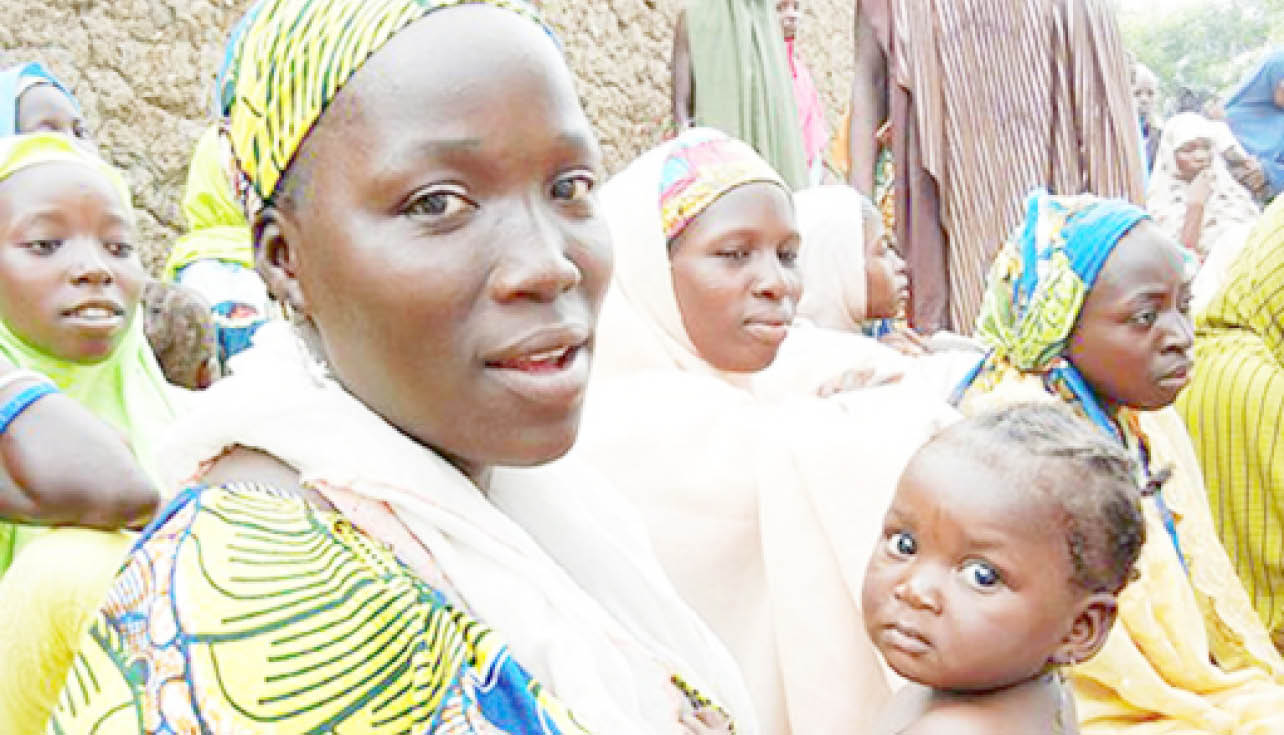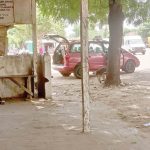Malam Musa from Mai’Adua village in Katsina State looked dazed. He lost his wife during childbirth. It was their second child. She died because there was no clinic where they lived in the village. Most women there have to make do with local birth attendants and herbs during complications.
“We lost her because we had no means to transport her to town for treatment. The baby was coming out with its legs and she was bleeding at the same time. The local child attendants did all they could, including administering several local herbs, but to no avail. We lost both mother and child,” Musa said.
These are some of the regular scenarios rural women face in various communities across the country.
According to the 2018 National Demographic Health Survey (NDHS), Nigeria’s Maternal Mortality Ratio (MMR) ranges from 447 to 578 deaths per 100,000 live births.
According to UNICEF, Nigeria’s 40 million women of childbearing age (between 15 and 49 years of age) suffer a disproportionally high level of health issues surrounding birth due to lack of access to healthcare services.
While the country represents 2.4 per cent of the world’s population, it currently contributes 10 per cent of global deaths for pregnant mothers.
According to the World Health Organization (WHO), the MMR of Nigeria was 814 deaths (per 100,000 live births) as at 2020.
The lifetime risk of a Nigerian woman dying during pregnancy, childbirth, postpartum or post-abortion is one in 22, in contrast to the lifetime risk in developed countries estimated at 1 in 4,900.
Inadequate primary healthcare facilities and health personnel in rural areas, poverty, bad roads and banditry are among factors fueling rising maternal and infant mortalities in rural areas.
This year’s International Day of Rural Women, celebrated on October 15, put its spotlight on “Rural Women Cultivating Good Food for All.”
Established by the United Nations (UN) General Assembly in its resolution 62/136 of December 18, 2007, the day recognizes “the critical role and contribution of rural women, including indigenous women, in enhancing agricultural and rural development, improving food security and eradicating rural poverty.”
The theme for this year highlighted the essential role rural women and girls play in the food systems of the world.
From production of crops to processing; preparation and distribution of foods, women’s labour – paid and unpaid – feed their families, communities and the world; yet, they do not wield equal power with men, and as a result, they earn less income and experience higher food insecurity.
In Nigeria, rural women are the worst hit by security challenges, ranging from banditry, terrorism and secession agitation in the country. In most rural areas, basic amenities are almost non-existent, thereby compounding the challenges faced by the women.
In Bayelsa State, women living in the rural communities have decried lack of social amenities, such as health facilities and potable water.
They also chided governments at all levels for not paying attention to the plight of women living in the rural communities.
Our correspondent who visited some of the riverine communities in Bayelsa State observed that aside the fact that health facilities are not readily available; the issue of potable water is a big challenge, as many of them still drink from the river.
Daily Trust reports that rural women still face challenges in having access to healthcare services and other social amenities despite billions of naira released to the Niger Delta Development Commission (NDDC) to carry out interventions in provisions of social amenities in communities in the Niger Delta region.
In the same vein, there are worries that successive governments in the state have not done enough in bettering the lots of rural dwellers despite billions of naira that have accrued to the state over the years.
It was also learnt that about 80 per cent of communities in the state are without health facilities, while general hospitals are lacking at the local government headquarters.
Most of the medical facilities are in Yenagoa, the state capital, which makes it difficult for aged rural women to access them when needed.
At Ayama-Ijaw community in Southern Ijaw Local Government Area, a rural dweller, Madam Roseline Timi, said the plight of women living in the rural communities was enormous and needed prompt attention by the government.
“The issue of health care is our major problem here. A woman in labour in this community pays her way to the Federal Medical Centre, a specialist hospital or any private hospital in Yenagoa before she can give birth. This means that if there is complication, the risk of death is high because of the distance to the health facilities.
“We have had issues where labour started at night, and considering our terrain and how communities are surrounded by river, we could not access any health facility. This has forced us to approach traditional birth attendants. So, I think the government should act fast and ensure that there is at least, a health centre in this area”, she said.
In Abia State, Daily Trust learnt that the absence of functional and accessible public health facilities is a major contributor to child and maternal mortality in many communities.
The absence of a primary health care centre in Obuohia Obi-Ibere community since the inception of the community about 100 years ago has left residents frustrated. Many of those who spoke with our correspondent expressed dissatisfaction with government’s inability to meet their health needs.
Accessing the community is also difficult, especially during the rainy season, as the road leading to it is in a very bad shape.
A resident of the community, Mrs Stella Onuoha, said the only thing the government established for them was an ill-equipped primary school, while other amenities were sponsored by members of the community.
Also, Mrs Amarachi Chukwuemeka Atuma, said that during labour, pregnant women in the community often travelled on motorcycles for about one hour to the nearest village where there is a private hospital.
Lady Ijeoma Oriaku said that because of the situation, some women would give birth on the road before making it to the hospital.

Kaduna women seek empowerment
Kyauta Samuel, a resident of Kakau community in Chikun Local Government Area of Kaduna State never had the opportunity to go to school, even though she had always wanted to be a big-time entrepreneur. Her dreams were shattered due to her parent’s inability to provide her basic education.
Due to family pressure and lack of opportunities, Kyauta was pressured into marriage at the age of 20 as the fourth wife of her husband, who her family felt would be an asset in taking the family out of poverty.
While in her matrimonial home in Sabon Gero community in the same local government area, Kyauta struggled to make ends meet by working in various homes as a domestic help, as well as engage in farming during the rainy season. She said, “During the rainy season, I and my co-wives, with the supervision of our husband, plant and harvest what the family will eat for the year.
“After the harvest, our husband will divide the grains amongst us. How we cook the food is up to us. That’s how it has been for the six years that I came into the family. And this is why women need to be empowered because, they are left to endure so much for the survival of the family,” she said.
She told our correspondent that she had not given up her dream of owning a business. “I struggle a lot and do many odd jobs, including working as a domestic help. I also engage in laundry and farming,” she said.
Asked if she knew about the International Day of the Rural Woman, she said she had never heard of it.
It is a similar situation for Miracle Sunday, who said the choice of becoming a domestic help was not hers. She had to do it to fend for herself. She said that after she lost her father at the age of two, she and her siblings had to go into the labour market to put food on the table.
She said. “All my life, l have been struggling, and it has not been easy. I always watch girls going to school with envy and wonder what my life would have been if I had gone to school.”
She hopes to send her own children to school so that they would not experience the hardship she is going through.
In Niger State, rural women decry access to health care services due to poverty and distance of facilities from their various villages.
Zainab Ibrahim, a resident of Lemu, Gbako Local Government Area of the state said, “Pregnant women in rural areas face a lot of challenges in accessing health care services, even during childbirth.
“Most of our husbands don’t have any means of transportation. Also, we find it difficult to meet up with health care expenses because most of us are not into any business. We rely on our husbands to provide for us.”
She appealed to the government to empower rural women to make them self-reliant, adding that most rural women engage in rigorous farming activities with their men to help provide for their families.
Another woman, Fatima Ibrahim also said the rate of poverty among rural women had increased due to the current economic hardship in the country. “We don’t do anything. We wait for our husbands to help us. And our husbands too are not finding it easy to survive and provide for the family. If the government can help us with jobs, we will appreciate it,” she said.
Daily Trust reports that though, the Federal Government had at some point rolled out various agricultural interventions such as FADAMA and APPEALS projects aimed at supporting farmers, rural women hardly benefit from such interventions.
For Rasheedat Alabi, a rural farmer from Olorunshogo, Bode Saadu in Moro Local Government Area of Kwara State, rural life had not been easy, especially in this age of modernisation.
“I and my husband are farmers. We grow cassava, maize, beans and tomatoes, among other crops. This is what we depend on to feed and train our four children. And we cannot afford to send them to better schools outside our community.
“In this age of the so-called globalisation, we are still in need of the basic necessities of life, like good roads, pipe borne water, stable electricity, among others,” she said.
She said women in rural areas most times relied on traditional methods of food preservation, adding, “We still practice crude farming methods. I and my husband spend N400 daily to the farm because of the state of the road.”
She lamented that despite promises, they still bought fertilizers and other farm inputs from the little they make. She appealed to the government to address challenges in the rural areas instead of focusing on cities.
For Mrs Marotana AbdulKareem, a resident of Asa Local Government Area, accessibility to health care has been a major issue for them as rural residents.
“Unlike those in the urban areas where there is proximity to hospitals and other health centres, our lifestyle here in the rural area is very tedious. We also lack access to basic health care,” she said.
She called on various state governments to provide basic amenities for rural dwellers.
“Ordinarily, we are supposed to be enjoying the best form of living because of our closeness to nature, but that is not the case. We should not be talking about the high cost of food, but other amenities. This has led to a rise in the cost of living in the rural areas”, she said.
Plateau women lament lack of empowerment, electricity
In Plateau State, the situation is not better. Our correspondent reports that life is very difficult for women in the rural areas, who lack access to basic social amenities.
Blessing Emmanuel, a resident of Lalin village of Mikang Local Government Area, told our correspondent that life has been difficult for women.
She said, “Women are not into businesses because they don’t have money. Life has become very difficult for them and nobody is there to help. When they look for work, they hardly get it.”
On access to social amenities, she said, “We are not enjoying that in our village. We have a health care facility, but it is not well equipped. There are no drugs, and if you have a serious illness, the health workers would always refer you to another hospital located in the city.
“Also, we are living in darkness because there has not been electricity in the village for many years. Potable water, which is also very essential, is nowhere to be found. In fact, in the entire village, we have only one borehole,” she said.
Women poorly taken care of in Kano
In Kano, rural women have been serving as catalyst for development, but they are usually poorly taken care of.
Findings show that they have been overburdened with responsibilities that supersede them.
Malama Maryam Kabiru, a 38-year-old mother of eight children from Warawa Local Government Area, said a typical day of a rural woman began with domestic chores. She has to do extra work, either as a trader or service provider to others to earn extra income for family upkeep.
“My husband will provide the grain, but it is up to me to find the means through which it will be converted to food. That is why I have to take the threshing job, while my grown up female children hawk on market days,” she said.
Daily Trust also gathered that many rural women in most remote areas do not attend antenatal care during pregnancy due to either the unavailability of health facilities or financial constraints, as well as distance of health facilities.
Our correspondent reliably gathered that rural women in the state hardly finish school as they are mostly married off as soon as they get suitors.
Jamila Bello, a 20-year-old mother of three, told our correspondent that she wished she had completed her primary school before she was married off.
She explained that she aspired to go to secondary school but was married off, and now, she is a young mother toiling to raise three children.
In Katsina, banditry takes tolls on rural women
In Katsina, apart from the general living condition of rural women, which is almost the same across the country, they are largely enterprising.
However, insecurity has caused untold hardship, particularly in the frontline local government areas mostly hit by banditry, kidnapping and cattle rustling.
Malama Rabi, a resident of Batsari Local Government Area, who is now taking refuge in Katsina town, said, “The living condition in rural areas cannot in any way be compared with that of city dwellers. Most of us were into small-scale businesses, such as local groundnut oil milling, selling of groundnut, cooked cassava, pap and akara (beans cake) and many other things.
“Some of us used the proceeds from these businesses to keep some domestic animals, which we usually sell and the money generated will be used to marry off our daughters. Some of us were into farming, but unfortunately, all that is gone with this problem of insecurity.”
Another rural dweller, Malama Hadiza Hussaini, said, “All our goats and sheep have been carted away by bandits. Some of our husbands used to travel to other parts of the country in search of money while we utilise what we have at hand to do one or two things that would fetch us some profit, but the thieves have shattered everything now.”
The situation is the same in almost all the rural communities bedevilled by banditry and kidnapping for ransom.
Responding, the Katsina State Government said it had done a lot in ameliorating the suffering of the rural women through different empowerment programmes.
Abdulkadir Mamman Nasir, the special adviser to Governor Masari on Empowerment, said, “Right from the inception of this administration in 2015, the governor has prioritised women empowerment through the 60:40 ratio sharing formula, in which 60 per cent of all empowerment programmes is given to women while 40 per cent is given to other groups.
Reacting to the issue, Chief Executive Officer, Nigerian Women Trust Fund (NWTF), Ms. Mufuliat Fijabi, said the challenge of access for women in health, education and other facets of human endeavours has been there for a very long time, saying, there was urgent need for the government to take steps in addressing them.
“It is not good for Nigeria as a country 61 years after independence. The government should step up action on the SDGs so the impact can be felt in all parts of the country,” Fijabi said.
On her part, the President, Women in Politics Forum (WIPF), Mrs Ebere Ifendu, attributed the precarious situation of rural women to failure of leadership.
“I feel sad that in this 21st Century, we still have high maternal mortality and morbidity; a country blessed by God with human and natural resources. Our politicians have failed us; shamelessly, they will still come back with excuses on why we should vote for them again.
“My advice is that we should reject them and ensure that only good women and men are elected. Our problem again is that women are not given an opportunity to bring in their expertise in governance. As long as political parties and leaders, side-line women, I am afraid the country will not make any tangible progress,” Ifendu.
Bassey Willie (Yenagoa), Abbas Jimoh (Abuja), Linus Effiong (Umuahia), Maryam Ahmadu-Suka (Kaduna), Abubakar Akote (Minna), Mumini AbdulKareem (Ilorin), Ado Abubakar Musa (Jos), Ibrahim Musa Giginyu (Kano) & Tijjani Ibrahim (Katsina)

 Join Daily Trust WhatsApp Community For Quick Access To News and Happenings Around You.
Join Daily Trust WhatsApp Community For Quick Access To News and Happenings Around You.


